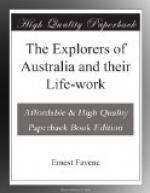But Oxley’s troubles were increasing, and on June 8th he wrote: “The whole country in these directions, as far as the eye can reach, was one continued thicket of eucalyptus scrub. It was impossible to proceed that way, and our situation was too critical to admit of delay: it was therefore resolved to return back to our last station on the 6th, under Peel’s Range, if for no other purpose than that of giving the horses water.”
Forced to return once more, Oxley became thoroughly convinced of the inhabitability of the country, and it is no wonder that his condemnation was so sweeping and hasty. He wrote on June the 21st:—
“The farther we proceed westerly, the more convinced I am that for all the practical purposes of civilised man the interior of this country westward of a certain meridian is uninhabitable, deprived as it is of wood, water and grass.”
Unfortunately for his fame, he then relinquished all thoughts and hopes of a southward course; for had he pushed on, posterity would have hailed his memory as the discoverer of the Murrumbidgee. But Fate decided otherwise, and dejected and baffled, he turned to follow the Peel Range north, making for the part he had left, where at least he was sure of a supply of water. The expedition suddenly came upon the river again on the 23rd of June, and hoping to find that it had modified its nature, they commenced to run it down again. The 7th of July they were forced to halt once more, when Oxley gave up all idea of tracing the Lachlan. He began his return journey, making this last desponding entry:—
“It is with infinite regret and pain that I was forced to come to the conclusion that the interior of this vast country is a marsh and uninhabitable...There is a dreary uniformity in the barren desolateness of this country which wearies one more than I am able to express. One tree, one soil, one water, and one description of bird, fish, or animal prevails alike for ten miles and for one hundred. A variety of wretchedness is at all times preferable to one unvarying cause of pain or distress.”
[Illustration. The Lachlan River at the point where Oxley left it on the 4th August, 1818, and struck North-East to gain the Macquarie River and follow that river up to Bathurst. Photo by the Reverend J.M. Curran.]
On the 4th of August, the leader, knowing the repellant nature of the river and its swamps and morasses that lay ahead of their returning footsteps, determined to quit the Lachlan altogether, and steering a northern course, to abandon the low country, reach the Macquarie River and follow it up to the settlement at Bathurst.




